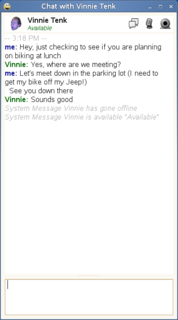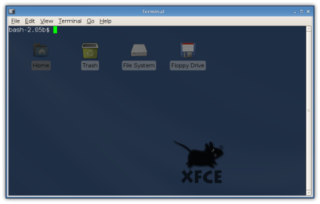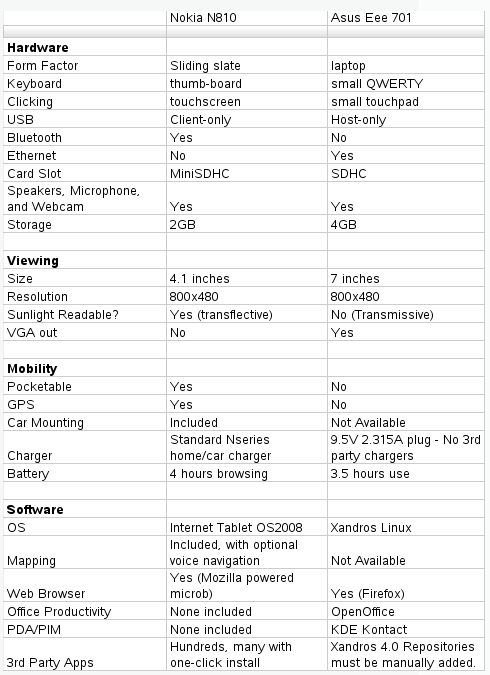
In case you are interested in how to run Opera Mini 4 on you Windows Mobile device as a default browser, head to my other blog post here …. cause I am loving it.

In case you are interested in how to run Opera Mini 4 on you Windows Mobile device as a default browser, head to my other blog post here …. cause I am loving it.
 ÐналитичеÑÐºÐ°Ñ ÐºÐ¾Ð¼Ð¿Ð°Ð½Ð¸Ñ ABI Research опубликовала отчёт об иÑÑледовании рыночных перÑпектив мобильных операционных ÑиÑтем на оÑнове Linux, и в чаÑтноÑти мобильной платформы Android, предÑтавленной недавно компанией Google. Ðналитики подтверждают, что Ñ„Ñ€Ð°Ð³Ð¼ÐµÐ½Ñ‚Ð°Ñ†Ð¸Ñ Ñ€Ñ‹Ð½ÐºÐ° мобильных Linux-платформ не даёт им возможноÑти иÑпользовать Ñвои конкурентные преимущеÑтва, так как наличие неÑкольких неÑовмеÑтимых платформ не удобно ни производителÑм ни операторам. Ð¢Ð°ÐºÐ°Ñ ÑÐ¸Ñ‚ÑƒÐ°Ñ†Ð¸Ñ Ð·Ð°Ð¼ÐµÐ´Ð»Ñет темпы роÑта рынка Linux-Ñмартфонов.
ÐналитичеÑÐºÐ°Ñ ÐºÐ¾Ð¼Ð¿Ð°Ð½Ð¸Ñ ABI Research опубликовала отчёт об иÑÑледовании рыночных перÑпектив мобильных операционных ÑиÑтем на оÑнове Linux, и в чаÑтноÑти мобильной платформы Android, предÑтавленной недавно компанией Google. Ðналитики подтверждают, что Ñ„Ñ€Ð°Ð³Ð¼ÐµÐ½Ñ‚Ð°Ñ†Ð¸Ñ Ñ€Ñ‹Ð½ÐºÐ° мобильных Linux-платформ не даёт им возможноÑти иÑпользовать Ñвои конкурентные преимущеÑтва, так как наличие неÑкольких неÑовмеÑтимых платформ не удобно ни производителÑм ни операторам. Ð¢Ð°ÐºÐ°Ñ ÑÐ¸Ñ‚ÑƒÐ°Ñ†Ð¸Ñ Ð·Ð°Ð¼ÐµÐ´Ð»Ñет темпы роÑта рынка Linux-Ñмартфонов.
Ð’ то же времÑ, по раÑÑчётам аналитиков ABI, Ð¼Ð¾Ð±Ð¸Ð»ÑŒÐ½Ð°Ñ Ð¿Ð»Ð°Ñ‚Ñ„Ð¾Ñ€Ð¼Ð° Android, за Ñчёт Ñвоей открытоÑти и активной поддержки Google может ÑоÑтавить Ñерьёзную конкуренцию платформам от ACCESS, Trolltech и другим мобильным Linux-разработкам. Ð’ результате вмеÑто фрагментированного Ñегмента рынка поÑвитÑÑ ÐµÐ´Ð¸Ð½Ð°Ñ, Ñильно ÑÑ‚Ð°Ð½Ð´Ð°Ñ€Ñ‚Ð¸Ð·Ð¾Ð²Ð°Ð½Ð½Ð°Ñ Ð¸ широко доÑÑ‚ÑƒÐ¿Ð½Ð°Ñ Ð¾Ð¿ÐµÑ€Ð°Ñ†Ð¸Ð¾Ð½Ð½Ð°Ñ ÑиÑтема, ÐºÐ¾Ñ‚Ð¾Ñ€Ð°Ñ Ð¼Ð¾Ð¶ÐµÑ‚ вытÑнуть мобильный Linux на уровень конкуренции Ñ Ð²ÐµÐ´ÑƒÑ‰Ð¸Ð¼Ð¸ пропиетарными платформами. Уже к 2012 году аналитики прогнозируют, что уровень ежегодных продаж Linux-Ñмартфонов подниметÑÑ Ð´Ð¾ 127 миллионов штук.

Â
“Well, all the core members of the team are OK with Open Sourcing it. Now we are checking to see if the community likes the idea and see if we can grow support for it. We want to be sure quality software, however, not have a bin-patch-mania of pieces of our hard work by other people. We are sure that Open Source people will submit their stuff to the tree so the software gets better. It open a lot of possibilities for the future and anyone will be able to participate with quality code.”
Gizmodo reports that the creators of iPhone unlocking app AnySIM have considered open-sourcing their application to spread their code far and wide, hopefully picking up many new coders and eyeballs in the process. They’ve apparently floated the idea about for a while, and found that no one objected to the deal. They then put the idea to the community at hackint0sh, a popular iPhone hacking forum and AnySIM’s main site. Reading from the threads on hackint0sh, it appears that initially most folks advocate keeping the source closed; if you’d rather read a more open-source friendly version of the same discussion there’s always slashdot.
 When your computer needs to run programs that are bigger than your available physical memory, most modern operating systems use a technique called swapping, in which chunks of memory are temporarily stored on the hard disk while other data is moved into physical memory space. Here are some techniques that may help you better manage swapping on Linux systems and get the best performance from the Linux swapping subsystem.
When your computer needs to run programs that are bigger than your available physical memory, most modern operating systems use a technique called swapping, in which chunks of memory are temporarily stored on the hard disk while other data is moved into physical memory space. Here are some techniques that may help you better manage swapping on Linux systems and get the best performance from the Linux swapping subsystem.
Linux divides its physical RAM (random access memory) into chucks of memory called pages. Swapping is the process whereby a page of memory is copied to the preconfigured space on the hard disk, called swap space, to free up that page of memory. The combined sizes of the physical memory and the swap space is the amount of virtual memory available.
Swapping is necessary for two important reasons. First, when the system requires more memory than is physically available, the kernel swaps out less used pages and gives memory to the current application (process) that needs the memory immediately. Second, a significant number of the pages used by an application during its startup phase may only be used for initialization and then never used again. The system can swap out those pages and free the memory for other applications or even for the disk cache.
Several months ago Novell started the project named Banter. It’s being called the next generation collaboration client. Think of it as software that combines all of your online “Web 2.0″ services along with chat, video, and voice into your contact management system.
Banter’s focus is on collaboration with people. One method of collaboration is IM. Banter will initially be focused on the big three: Video, Audio, and Text chats. Banter’s user experience will be around people (not buddies from specific services) and all the ways you work with them. Future collaboration methods may include email, blogs, photo sharing, whiteboarding, teaming, web conferencing, etc. Banter’s goal is not to implement all of these services and technologies, but bring them together so the data around the people you collaborate with is all brought together.



The chat window can handle text, audio, and video chat. Text chat is always available so you can send links or information while having and audio or video chat. Audio and Video can be started and stopped at any time during a chat. The project is focused on providing a simple quality experience for the end user. Banter is built on the telepathy project, and thus is not trying to re-invent the wheel but provide collaborative user experience on existing frameworks.
Banter is available on the openSUSE build service and is currently in alpha, the latest release being 0.1.10 with GTalk support. This project is being done in the open from the very beginning. In fact, if you want to see what we are doing, you can visit the Banter wiki at http://banter-project.org.
Banter in openSUSE 10.3 Â | Â Â Packages on the build server
Found this video on youtube where user criticizes MS Office’07 and recommending on switching to OOo, version 2.3 in this video. His words go on to say:
“I strongly advise you don’t get Microsoft Office 2007 – any of the editions – you ARE getting ripped off!!” and …. “And if you have a Mac, download NeoOffice, a better version of OpenOffice for Mac users:”
Intel Based Macs: http://gulus.usherbrooke.ca/pub/appl/…
Other based Macs: http://www.planamesa.net/neojava/down…
{ …. but why uninstalled it !!!}
To Download OpenOffice, go to: http://download.openoffice.org/
 This week in DistroWatch Weekly:
This week in DistroWatch Weekly:
| Ubuntu | PCLinuxOS | openSUSE | Fedora | Mint | Sabayon | MEPIS | Freespire | |
| Ease of installation |  |
 |
 |
 |
 |
 |
 |
 |
| Ease of use |  |
 |
 |
 |
 |
 |
 |
 |
| Package management |  |
 |
 |
 |
 |
 |
 |
 |
| Speed |  |
 |
 |
 |
 |
 |
 |
 |
| Average | 8.75 | 8.5 | 7.75 | 6.5 | 9 | 6 | 7.25 | 8 |
Read more in this week’s issue of DistroWatch Weekly….


“Really the big basic difference is that Ubuntu is a simplified cookie cutter distribution designed to not overwhelm the new user with choice. openSUSE on the other hand is the polar opposite offering choices for every aspect of Linux computing. openSUSE is very scalable and it can be as easy or advanced as one needs. You could install openSUSE on a dozen machines and none be the same if that was your wish, whereas install Ubuntu on a dozen machines and it would be exactly alike except some might not be able to connect to the internet.”
“There really isn’t much of a comparison between these two distros as they are so vastly different in target audience, capabilities, and philosophies. If you are a brand new Linux user perhaps you should get your feet wet with Ubuntu as openSUSE might seem a bit overwhelming. After a coupla weeks and you begin to feel claustrophobic, then branch out to try openSUSE. If you have any Linux or advanced Windows experience, then you might prefer the functionality found in openSUSE.”
 Xfce 4.4.2 is now available. It’s the second maintenance release in the 4.4 stable series, focusing on fixing bugs and updating translations.
Xfce 4.4.2 is now available. It’s the second maintenance release in the 4.4 stable series, focusing on fixing bugs and updating translations.
Xfce 4.4.2 Changes include:
Window Manager (xfwm4):
Be more relax with transients, allow transients to be sticky independently of their parent window (Bug #3296).
Fix xfwm4 hanging with gtk+-2.11.x (Bug #3346).
Plug a leak in mouse button grab when changing theme.
Fix dialogs and modals without parents not being automatically centered like before (Bug #3278).
Fix modifier mask not working with all keymaps (Bug #3194).
Fix wrong count of key shortcuts causing switch to last workspace on modifier key press if no window is focused (Bug #3191).
Fix spec file missing from the tar ball causing ‘make dist’ to fail.
Fix strict bound checking causing wrong window to be focused in focus follow mouse (Bug #2781).
Transients for group shouldn’t apply to other transients, or it breaks stacking for some apps, noticeably mozilla “save as” dialog…
Fix typo breaking compilation on systems without XShape 1.1 support.

Full Changelog |  Downloads |  Full Annoucement
The first thing to address: Are these two devices truly competitors? The answer is yes – but only to consumers who don’t know what they REALLY want. You see – Both are extremely portable 800×480 Internet centric Linux devices in the $400-$470 street price range. However, both have clear cut advantages in certain areas that would only be of benefit to people who knew those advantages beforehand and used them as a basis for a purchasing decision.

